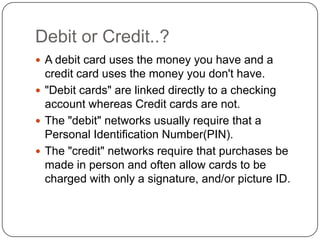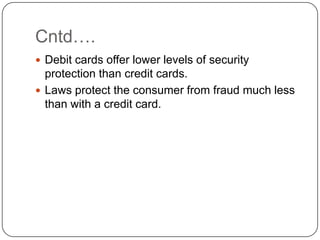Debit And Credit Cards
- 1. Debit And Credit CardsByM.Vivek
- 2. Debit CardAlso known as Bank Card or Check Card.A debit card is a plastic card that provides an alternative payment method to cash when making purchases.It can be called an electronic cheque, as the funds are withdrawn directly from either the bank account, or from the remaining balance on the card.
- 3. Credit CardCredit cards allow you to 'buy goods now and pay later' - called 'buying on credit'. They aren't linked to your bank account.If you don't repay your bill in full by the date shown you're charged interest on the whole amount of the bill for that month. The rates of interest - indicated by the APR (annual percentage rate) - is very high.
- 4. Debit or Credit..?A debit card uses the money you have and a credit card uses the money you don't have."Debit cards" are linked directly to a checking account whereas Credit cards are not.The "debit" networks usually require that a Personal Identification Number(PIN).The "credit" networks require that purchases be made in person and often allow cards to be charged with only a signature, and/or picture ID.
- 5. Advantages of Debit CardsA consumer who is not credit worthy and may find it difficult or impossible to obtain a credit card can more easily obtain a debit card.Use of a debit card is limited to the existing funds in the account to which it is linked.A debit card may be used to obtain cash from an ATM or a PIN-based transaction at no extra charge, other than a foreign ATM fee.
- 6. DisadvantagesMany banks are now charging non-sufficient funds fees based upon pre-authorizations.Many merchants mistakenly believe that amounts owed can be "taken" from a customer's account after a debit card (or number) has been presented, without agreement as to date, payee name, amount and currency, thus causing penalty fees for overdrafts.
- 7. CntdâĶ.Debit cards offer lower levels of security protection than credit cards.Laws protect the consumer from fraud much less than with a credit card.







